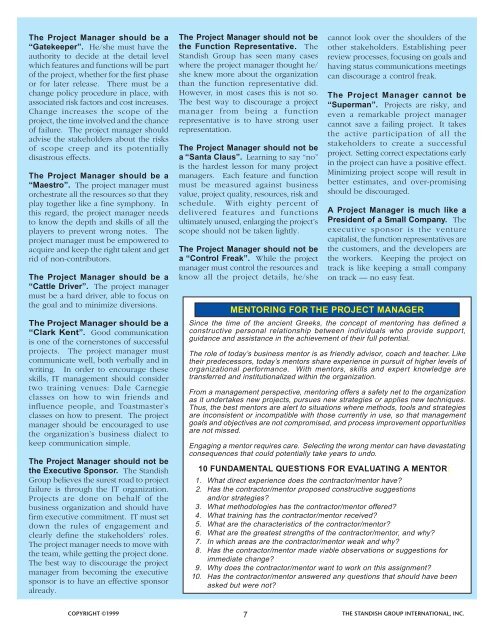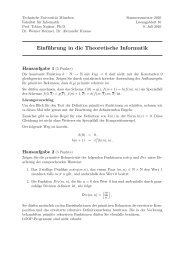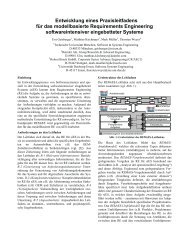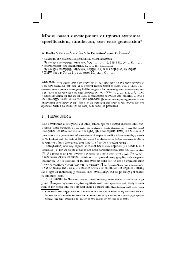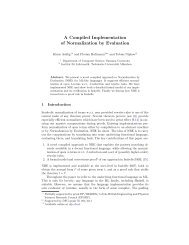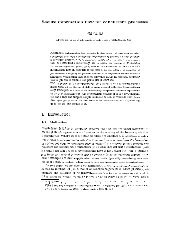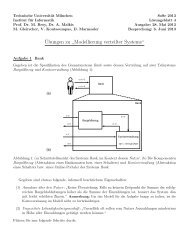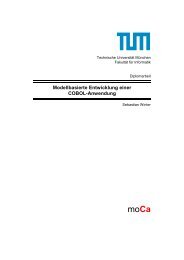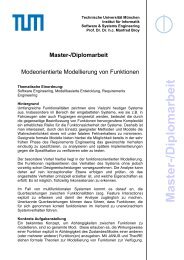CHAOS: A Recipe for Success - Software and Systems Engineering
CHAOS: A Recipe for Success - Software and Systems Engineering
CHAOS: A Recipe for Success - Software and Systems Engineering
Create successful ePaper yourself
Turn your PDF publications into a flip-book with our unique Google optimized e-Paper software.
The Project Manager should be a“Gatekeeper”. He/she must have theauthority to decide at the detail levelwhich features <strong>and</strong> functions will be partof the project, whether <strong>for</strong> the first phaseor <strong>for</strong> later release. There must be achange policy procedure in place, withassociated risk factors <strong>and</strong> cost increases.Change increases the scope of theproject, the time involved <strong>and</strong> the chanceof failure. The project manager shouldadvise the stakeholders about the risksof scope creep <strong>and</strong> its potentiallydisastrous effects.The Project Manager should be a“Maestro”. The project manager mustorchestrate all the resources so that theyplay together like a fine symphony. Inthis regard, the project manager needsto know the depth <strong>and</strong> skills of all theplayers to prevent wrong notes. Theproject manager must be empowered toacquire <strong>and</strong> keep the right talent <strong>and</strong> getrid of non-contributors.The Project Manager should be a“Cattle Driver”. The project managermust be a hard driver, able to focus onthe goal <strong>and</strong> to minimize diversions.The Project Manager should be a“Clark Kent”. Good communicationis one of the cornerstones of successfulprojects. The project manager mustcommunicate well, both verbally <strong>and</strong> inwriting. In order to encourage theseskills, IT management should considertwo training venues: Dale Carnegieclasses on how to win friends <strong>and</strong>influence people, <strong>and</strong> Toastmaster’sclasses on how to present. The projectmanager should be encouraged to usethe organization’s business dialect tokeep communication simple.The Project Manager should not bethe Executive Sponsor. The St<strong>and</strong>ishGroup believes the surest road to projectfailure is through the IT organization.Projects are done on behalf of thebusiness organization <strong>and</strong> should havefirm executive commitment. IT must setdown the rules of engagement <strong>and</strong>clearly define the stakeholders’ roles.The project manager needs to move withthe team, while getting the project done.The best way to discourage the projectmanager from becoming the executivesponsor is to have an effective sponsoralready.The Project Manager should not bethe Function Representative. TheSt<strong>and</strong>ish Group has seen many caseswhere the project manager thought he/she knew more about the organizationthan the function representative did.However, in most cases this is not so.The best way to discourage a projectmanager from being a functionrepresentative is to have strong userrepresentation.The Project Manager should not bea “Santa Claus”. Learning to say “no”is the hardest lesson <strong>for</strong> many projectmanagers. Each feature <strong>and</strong> functionmust be measured against businessvalue, project quality, resources, risk <strong>and</strong>schedule. With eighty percent ofdelivered features <strong>and</strong> functionsultimately unused, enlarging the project’sscope should not be taken lightly.The Project Manager should not bea “Control Freak”. While the projectmanager must control the resources <strong>and</strong>know all the project details, he/she10 FUNDAMENTAL QUESTIONS FOR EVALUATING A MENTOR:1.2.3.4.5.6.7.8.9.10.cannot look over the shoulders of theother stakeholders. Establishing peerreview processes, focusing on goals <strong>and</strong>having status communications meetingscan discourage a control freak.The Project Manager cannot be“Superman”. Projects are risky, <strong>and</strong>even a remarkable project managercannot save a failing project. It takesthe active participation of all thestakeholders to create a successfulproject. Setting correct expectations earlyin the project can have a positive effect.Minimizing project scope will result inbetter estimates, <strong>and</strong> over-promisingshould be discouraged.A Project Manager is much like aPresident of a Small Company. Theexecutive sponsor is the venturecapitalist, the function representatives arethe customers, <strong>and</strong> the developers arethe workers. Keeping the project ontrack is like keeping a small companyon track — no easy feat.MENTORING FOR THE PROJECT MANAGERSince the time of the ancient Greeks, the concept of mentoring has defined aconstructive personal relationship between individuals who provide support,guidance <strong>and</strong> assistance in the achievement of their full potential.The role of today’s business mentor is as friendly advisor, coach <strong>and</strong> teacher. Liketheir predecessors, today’s mentors share experience in pursuit of higher levels o<strong>for</strong>ganizational per<strong>for</strong>mance. With mentors, skills <strong>and</strong> expert knowledge aretransferred <strong>and</strong> institutionalized within the organization.From a management perspective, mentoring offers a safety net to the organizationas it undertakes new projects, pursues new strategies or applies new techniques.Thus, the best mentors are alert to situations where methods, tools <strong>and</strong> strategiesare inconsistent or incompatible with those currently in use, so that managementgoals <strong>and</strong> objectives are not compromised, <strong>and</strong> process improvement opportunitiesare not missed.Engaging a mentor requires care. Selecting the wrong mentor can have devastatingconsequences that could potentially take years to undo.What direct experience does the contractor/mentor have?Has the contractor/mentor proposed constructive suggestions<strong>and</strong>/or strategies?What methodologies has the contractor/mentor offered?What training has the contractor/mentor received?What are the characteristics of the contractor/mentor?What are the greatest strengths of the contractor/mentor, <strong>and</strong> why?In which areas are the contractor/mentor weak <strong>and</strong> why?Has the contractor/mentor made viable observations or suggestions <strong>for</strong>immediate change?Why does the contractor/mentor want to work on this assignment?Has the contractor/mentor answered any questions that should have beenasked but were not?COPYRIGHT ©19997THE STANDISH GROUP INTERNATIONAL, INC.


